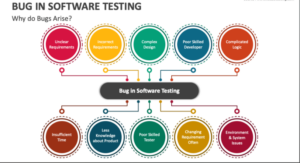Software testing has become a critical aspect of software development. Ensuring that applications are free of bugs and perform as expected before going live is essential to providing an excellent user experience. As a result, the demand for skilled software testers has surged, and more professionals are turning to specialized training and placement programs to accelerate their careers. This blog explores how comprehensive Software testing has become a critical aspect of software development. Ensuring that applications are free of bugs and perform as expected before going live is essential to providing an excellent user experience. As a result, the demand for skilled software testers has surged, and more professionals are turning to specialized Software Testing Training and Placement to accelerate their careers. This blog explores how comprehensive software testing training programs can significantly boost your career prospects and provide a pathway to success in this lucrative field.
programs can significantly boost your career prospects and provide a pathway to success in this lucrative field.
The Growing Importance of Software Testing Training and Placement
With businesses across industries depending on software to run operations smoothly, the importance of ensuring that this software functions flawlessly has never been greater. Even a minor bug can cause significant disruptions, affecting the bottom line and leading to customer dissatisfaction. Hence, companies are prioritizing quality assurance (QA) and testing processes as integral parts of software development.
Software testing ensures that products are efficient, reliable, and user-friendly, meeting both functional and non-functional requirements. By identifying defects early in the development lifecycle, testing helps avoid costly fixes post-launch, contributing to higher user satisfaction and fewer critical issues in production.
Why Choose Software Testing as a Career?
Choosing a career in software testing offers several advantages, particularly in a world where technology is rapidly evolving:
- High Demand: The increased reliance on digital platforms and cloud-based applications has created an unprecedented demand for skilled software testers. Organizations need professionals who can test these systems across different platforms and devices.
- Diverse Job Opportunities: Software testing offers a variety of roles, from manual testing to automation and performance testing. There are also opportunities to specialize in niches such as security testing, API testing, and mobile app testing.
- Attractive Salaries: With the growing demand for testers, salaries have become competitive. Skilled testers, especially those with automation and advanced testing skills, can command higher salaries.
- Gateway to Other IT Roles: Many professionals start in software testing and later move into roles like business analysis, project management, or software development. The skills gained in testing such as attention to detail and problem-solvingVare transferable to other IT fields.
Key Components of Comprehensive Software Testing Training Programs
To succeed in this field, it is essential to undergo structured training that covers both theoretical knowledge and practical experience. Comprehensive software testing training programs typically offer:
In-Depth Curriculum
A well-rounded training program covers various aspects of software testing, including:
- Manual Testing: Introduction to software testing methodologies, bug tracking, writing test cases, and performing functional and regression testing.
- Automation Testing: Learning how to write scripts and use tools like Selenium, JUnit, and TestNG to automate repetitive test cases. Automation is increasingly important in modern testing as it improves efficiency and accuracy.
- Performance Testing: Understanding tools like JMeter and LoadRunner to measure the performance, scalability, and stability of applications under load.
- API Testing: API testing ensures that application programming interfaces (APIs) function as expected. Tools like Postman and SoapUI are used to verify APIs.
- Mobile Testing: With the rise of mobile apps, learning how to test on different mobile platforms and devices is critical. Training programs often cover tools like Appium for mobile automation.
- Security Testing: As cyber threats continue to rise, the ability to identify vulnerabilities in applications becomes increasingly important. Security testing involves checking for weaknesses that could be exploited by malicious users.
Hands-On Experience
Theory alone is not enough to excel in software testing. Practical, hands-on experience is vital for mastering testing tools and processes. A good training program provides live projects or simulations where participants can apply their knowledge to real-world testing scenarios.
- Real-World Projects: These projects mimic the actual testing environments found in the workplace. Participants are encouraged to identify and fix defects, write and execute test cases, and ensure software quality.
- Tool Usage: Hands-on experience with popular tools like Selenium, JIRA, and QTP (QuickTest Professional) ensures you are well-prepared for the workplace.
Mentorship and Guidance
Having access to experienced mentors can make a big difference in your learning journey. Many comprehensive software testing programs provide guidance from industry experts who can offer valuable insights, help with difficult concepts, and provide career advice.
Mentorship is especially important when preparing for certification exams, troubleshooting projects, and navigating job placement processes.
Certification
Obtaining a certification in software testing is an excellent way to validate your skills and make yourself stand out to potential employers. Popular certifications include:
- ISTQB (International Software Testing Qualifications Board): Recognized globally, ISTQB certifications provide a foundation in software testing principles, processes, and techniques.
- Certified Software Tester (CSTE): Offered by the Quality Assurance Institute, this certification is for experienced software testers looking to advance their careers.
Certifications not only enhance your credibility but also indicate that you are committed to continuous learning and professional development.
The Role of Placement Programs in Career Acceleration
After completing training, placement programs play a critical role in helping participants land their first job or advance their career in software testing. These programs provide a bridge between learning and employment by offering the following:
Resume and Interview Preparation
Placement programs typically provide assistance with resume building and interview preparation. This includes crafting a resume that highlights your skills and experiences effectively, as well as coaching on how to respond to common interview questions in the software testing field.
Many placement programs offer mock interviews with industry professionals, helping you gain confidence and understand the type of questions employers are likely to ask.
Job Placement Assistance
A significant benefit of comprehensive training programs is the job placement assistance that often accompanies them. Training providers may have partnerships with leading companies, which increases your chances of getting hired after completing the program.
Some programs even offer guaranteed job placement services, which can be a great incentive for those looking to switch careers or enter the software testing field for the first time.
Networking Opportunities
Many training and placement programs offer access to exclusive networking opportunities, including job fairs, alumni networks, and connections with hiring managers in the industry. Networking is key to finding job opportunities and building relationships with other professionals in the field.
Benefits of Comprehensive Software Testing Training
Enrolling in a comprehensive Quality assurance software training program can offer numerous advantages:
Structured Learning Path
A structured learning path ensures that you gain all the necessary skills progressively. Training programs are designed to guide you from the basics to more advanced concepts, ensuring that you become proficient in software testing methodologies and tools.
Access to Industry-Standard Tools
Learning how to use industry-standard testing tools during your training makes you more attractive to employers. By gaining experience with tools like Selenium, JIRA, and Postman, you demonstrate that you can hit the ground running when hired.
Career Flexibility
Software testing offers a wide range of career paths, from manual testing to specialized fields like security and performance testing. A comprehensive training program allows you to explore different areas of interest and choose a niche that aligns with your career goals.
Job Readiness
Comprehensive training programs are designed to make you job-ready. With practical projects, hands-on experience, and certification opportunities, these programs ensure that you possess the technical skills and the confidence needed to excel in your role.
Conclusion:
In an era of rapid technological advancements, software testing has become a crucial aspect of the software development lifecycle. Comprehensive Software testing training with placement programs offer the knowledge, practical experience, and job support necessary to accelerate your career in this high-demand field.
By gaining proficiency in testing methodologies, tools, and real-world applications, you can position yourself as a valuable asset to any organization. Additionally, with the right certification and placement assistance, you can find job opportunities that align with your career aspirations. Whether you are new to software testing or looking to advance your career, enrolling in a comprehensive training program can be the key to unlocking your professional potential and achieving success in this dynamic field.
Take the step today invest in a comprehensive software testing training and placement program, and watch your career soar to new heights.































6 Responses